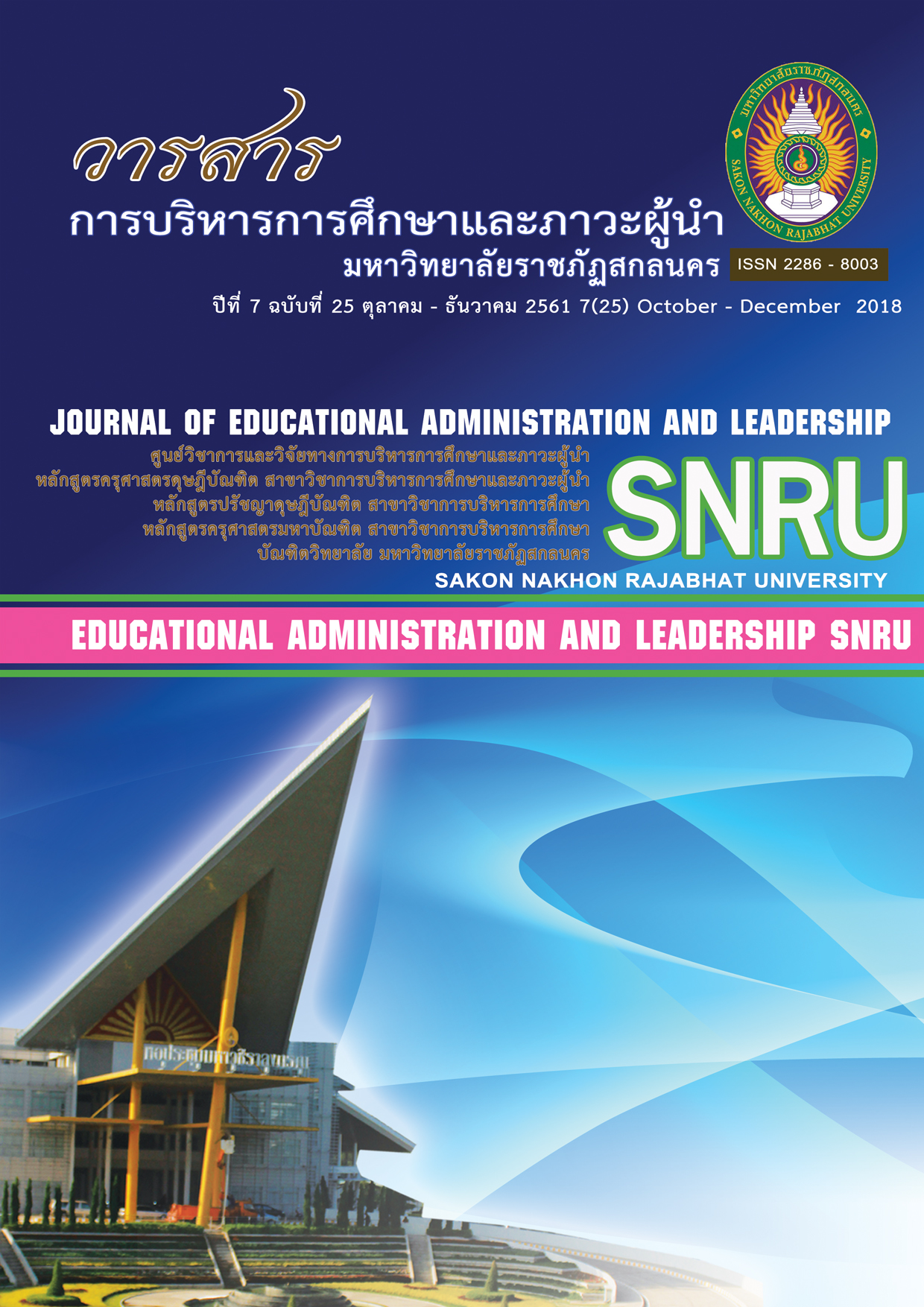

การพัฒนาชุดการเรียนรู้แบบกลวิธีสืบสอบร่วมกับหลักอริยสัจ 4 ที่มีผลต่อความรับผิดชอบความสามารถในการแก้โจทย์ปัญหา และผลสัมฤทธิ์ทางการเรียนวิชาคณิตศาสตร์ ของนักเรียนชั้นมัธยมศึกษาปีที่ 1
The Developing Learning set Using the Inquiry Strategies With Four Noble Truths Affecting Responsibilities, Mathematical Problems Solving Ability and Learning Achievements Substance Of Math for Muttayomsuksa 1 Students
ผู้แต่ง
ชลธิชา กุลยะ, มารศรี กลางประพันธ์, สมเกียรติ พละจิตต์
บทคัดย่อ
การวิจัยครั้งนี้มีความมุ่งหมายเพื่อ 1) พัฒนาชุดการเรียนรู้แบบกลวิธีสืบสอบร่วมกับหลักอริยสัจ 4 ของนักเรียนชั้นมัธยมศึกษาปีที่ 1 ให้มีประสิทธิภาพตามเกณฑ์ 80/80 2) เปรียบเทียบความรับผิดชอบของนักเรียน 3) เปรียบเทียบความสามารถในการแก้โจทย์ปัญหาของนักเรียน 4) เปรียบเทียบผลสัมฤทธิ์ทางการเรียน และ 5) เปรียบเทียบความรับผิดชอบ ความสามารถในการแก้โจทย์ปัญหา และผลสัมฤทธิ์ทางการเรียนของนักเรียนที่เรียนด้วยชุดการเรียนรู้แบบกลวิธีสืบสอบร่วมกับหลักอริยสัจ 4 จำแนกตามระดับความฉลาดทางอารมณ์ของนักเรียนกลุ่มสูง กลุ่มปานกลาง และกลุ่มต่ำ ระหว่างก่อนเรียนและหลังเรียน เครื่องมือที่ใช้ในการวิจัยประกอบด้วย 1) ชุดการเรียนรู้แบบกลวิธีสืบสอบร่วมกับหลักอริยสัจ 4 จำนวน 6 หน่วยการเรียนรู้ 2) แบบทดสอบวัดความรับผิดชอบ 3) แบบทดสอบวัดความสามารถในการแก้โจทย์ปัญหา 4) แบบทดสอบวัดผลสัมฤทธิ์ทางการเรียน และ 5) แบบวัดความฉลาดทางอารมณ์ ของกรมสุขภาพจิต กระทรวงสาธารณสุข สถิติที่ใช้ในการวิเคราะห์ข้อมูลได้แก่ ร้อยละ ค่าเฉลี่ย ส่วนเบี่ยงเบนมาตรฐาน สถิติทดสอบค่าที (t–test for Dependent Samples) การวิเคราะห์ความแปรปรวนทางเดียว (One–Way ANOVA) การวิเคราะห์ความแปรปรวนพหุคูณ (One–Way MANCOVA) และการวิเคราะห์ความแปรปรวนร่วมทางเดียว (One–Way ANCOVA)
ผลการวิจัย พบว่า
1. ชุดการเรียนรู้แบบกลวิธีสืบสอบร่วมกับหลักอริยสัจ 4 ที่ส่งผลต่อความรับผิดชอบ ความสามารถในการแก้โจทย์ปัญหา และผลสัมฤทธิ์ทางการเรียน ของนักเรียนชั้นมัธยมศึกษาปีที่ 1 มีประสิทธิภาพตามเกณฑ์ เท่ากับ 81.00/85.14 ซึ่งสูงกว่าเกณฑ์ 80/80 ที่กำหนดไว้
2. ความรับผิดชอบ ของนักเรียนที่เรียนโดยใช้ชุดการเรียนรู้แบบกลวิธีสืบสอบร่วมกับหลักอริยสัจ 4 หลังเรียนสูงกว่าก่อนเรียนอย่างมีนัยสำคัญทางสถิติที่ระดับ .05
3. ความสามารถในการแก้โจทย์ปัญหา ของนักเรียนที่เรียนโดยใช้ชุดการเรียนรู้แบบกลวิธีสืบสอบร่วมกับหลักอริยสัจ 4 หลังเรียนสูงกว่าก่อนเรียนอย่างมีนัยสำคัญทางสถิติที่ระดับ .05
4. ผลสัมฤทธิ์ทางการเรียนของนักเรียนที่เรียนโดยใช้ชุดการเรียนรู้แบบกลวิธีสืบสอบร่วมกับหลักอริยสัจ 4 หลังเรียนสูงกว่าก่อนเรียนอย่างมีนัยสำคัญทางสถิติที่ระดับ .05
5. ความฉลาดทางอารมณ์ของนักเรียนที่ต่างกัน หลังเรียนโดยใช้ชุดการเรียนรู้แบบกลวิธีสืบสอบร่วมกับหลักอริยสัจ 4 มีความรับผิดชอบ ความสามารถในการแก้โจทย์ปัญหา และผลสัมฤทธิ์ทางการเรียน มีความแตกต่างกัน อย่างมีนัยสำคัญทางสถิติที่ระดับ .05 ปรากฏผลดังนี้
5.1 นักเรียนที่มีระดับความฉลาดทางอารมณ์สูง มีความรับผิดชอบสูงกว่านักเรียนที่มีระดับความฉลาดทางอารมณ์ปานกลาง และต่ำ อย่างมีนัยสำคัญทางสถิติที่ระดับ .05
5.2 นักเรียนที่มีระดับความฉลาดทางอารมณ์สูง มีความสามารถในการแก้โจทย์ปัญหาสูงกว่านักเรียนที่มีระดับความฉลาดทางอารมณ์ปานกลาง และต่ำอย่างมีนัยสำคัญทางสถิติที่ระดับ .05
5.3 นักเรียนที่มีระดับความฉลาดทางอารมณ์สูง มีผลสัมฤทธิ์ทางการเรียนสูงกว่านักเรียนที่มีระดับความฉลาดทางอารมณ์ปานกลาง และต่ำอย่างมีนัยสำคัญทางสถิติที่ระดับ .05
Abstract
The purposes of this study were to 1) develop learning set using the inquiry strategies with four noble truths affecting responsibilities, mathematical problems solving ability and learning achievements substance of math for Muttayomsuksa 1 students with efficiency of 80/80 2) compare responsibilities 3) compare mathematical problems solving ability 4) compare learning achievements 5) compare responsibilities, mathematical problems solving ability and learning achievements using learning set using the inquiry strategies with four noble truths by the level of emotional intelligence of students in the high. The instruments were composed of : 1) learning set using the inquiry strategies with four noble truths 2) test of responsibilities, 3) test of mathematical problems solving ability 4) test of learning achievements, and 5) a measure of emotional intelligence Department of Mental Health Ministry of Public Health. The statistics use to analyze data were percentage, comprised mean, standard deviation, t–test (Dependent Samples), Analysis of Variance (ANOVA), Multivariate Analysis of Variance (MANCOVA), and Analysis of Covariance (ANCOVA)
The findings of this study were as follows :
1. The Development of learning set using the inquiry strategies with four noble truths affecting responsibilities, mathematical problems solving ability and learning achievements substance of math for Muttayomsuksa 1 students were 81.00/85.14 respectively.
2. The students’ responsibilities after learning set using the inquiry strategies with four noble truths was higher than before Instruction at the .05 level of significance.
3. The students’ mathematical problems solving ability after learning set using the inquiry strategies with four noble truths was higher than before Instruction at the .05 level of significance.
4. The students’ learning achievements after learning set using the inquiry strategies with four noble truths was higher than before Instruction at the .05 level of significance.
5. Students with different emotional intelligence after learning set using the inquiry strategies with four noble truths. Responsibilities, mathematical problems solving ability and learning achievement. Are different statistically significant at the .05 level.
5.1 The students whose emotional intelligence level was high had responsibilities higher than those whose emotional Intelligence level was moderate or low at the .05 level.
5.2 The students whose emotional intelligence level was high had mathematical problems solving ability higher than those whose emotional intelligence level was moderate or low at the .05 level.
5.3 The students whose emotional intelligence level was high had and learning achievements higher than those whose emotional intelligence level was moderate or low at the .05 level.
คำสำคัญ
ชุดการเรียนรู้, แบบกลวิธีสืบสอบ, หลักอริยสัจ 4, ความรับผิดชอบ, ความสามารถในการแก้โจทย์ปัญหา, ผลสัมฤทธิ์ทางการเรียนKeyword
Learning Set, Inquiry Strategies, Four Noble Truths, Responsibilities, Mathematical Problems Solving Ability, Learning AchievementsNotice: Undefined variable: dataSet in /var/www/html/ArticleView.php on line 116
Notice: Trying to access array offset on value of type null in /var/www/html/ArticleView.php on line 116
บทความทุกบทความเป็นลิขสิทธิ์ของ
Notice: Undefined variable: dataSet in /var/www/html/ArticleView.php on line 116
Notice: Trying to access array offset on value of type null in /var/www/html/ArticleView.php on line 116
เท่านั้น
กำลังออนไลน์: 12
วันนี้: 732
เมื่อวานนี้: 7,862
จำนวนครั้งการเข้าชม: 1,218,444
อาคารบัณฑิตวิทยาลัย ชั้น 2 ตำบลธาตุเชิงชุม อำเภอเมือง จังหวัดสกลนคร 47000
โทร/
แฟกซ์ 0-4297-0093
บรรณาธิการ: รองศาสตราจารย์ ดร.ไชยา ภาวะบุตร
ติดต่อ/สอบถาม: นายธีรเวทย์ เพียรธัญญกรณ์
โทร: 0-4297-0093